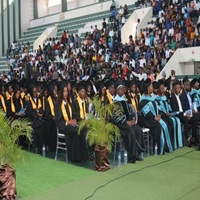
UniLicungo – Beira, graduates with a focus on the challenges of Excellence and Innovation

Paulo Vilanculo"
Licungo University, in its Beira branch, is preparing to graduate another group of students on September 19th, in a context where higher education in Mozambique is marked by both advancements and contradictions. The Licungo-Beira graduation ceremony, beyond celebration and victory, raises questions of analysis and understanding, from the perspective of how we can transform emerging universities into true hubs of scientific and cultural excellence, reconciling the urgent need to train more professionals with the demand for quality that a university must offer and overcoming the structural precariousness that threatens to erode the prestige of higher education institutions in Mozambique.
Keywords:Higher education; undergraduate studies; excellence; academic innovation; Mozambique.
Licungo University will graduate another group of students in various fields of knowledge on September 19th in the city of Beira. The ceremony, imbued with solemnity and hope, represents not only the culmination of years of academic effort but also the realization of a collective dream of institutional, social, and human growth. While thousands of graduates graduate every year, doubts persist about the actual quality of training and the market's ability to absorb this human capital.
From a standpoint of excellence, the institution has sought to assert itself through the diversification of courses, the integration of graduates into the job market, and the creation of bridges between academia and society. The expansion of Beira demonstrates the university's desire to be closer to students and the local community, contributing to the training of professionals who can drive regional development. However, the need to expand higher education in Mozambique is accompanied by profound dilemmas. While, on the one hand, there is a visible effort to expand and democratize access, on the other, challenges persist related to the lack of operational conditions, inadequate infrastructure, lack of IT resources, and a shortage of faculty.
On the one hand, the lack of institutional autonomy keeps many universities tied to centralized decisions, unable to define their own strategies and priorities. Added to this is financial dependence, based almost exclusively on tuition fees and insufficient government budgets, which stifle any plan for sustainable growth. A university lacking financial management autonomy operates without equipped laboratories, IT resources, or support for research activities, and this can hardly claim the status of "excellence."
Another obstacle is social necessity, which drives thousands of young people to university, even when institutions lack the appropriate infrastructure. The widespread access to university contrasts with the limited availability of qualified human resources, adequate infrastructure, and consistent public funding policies. What we observe, in many cases, is an attempt to respond to social pressure for higher education with fragile and precarious structures, where the title of "university" does not always meet the international standards of the term. Many students face a lack of up-to-date libraries, equipped laboratories, and social support to maintain their academic path. Thus, "university excellence" coexists with the need to respond to social pressure for higher education and the structural precariousness that threatens academic quality.
The absence of innovation is evident, driven by a shortage of technological resources, laboratories, and research incentive policies. Innovation will never exist without technological resources, research centers, and incentive policies. Most institutions are limited to traditional education, with little scientific production and innovation applicable to the Mozambican reality. This reflects the weaknesses and precariousness that continue to characterize the sector. The precariousness that characterizes higher education in Mozambique, which together prevents the discourse of "excellence" from materializing into solid and transformative university practice, is not the result of a single isolated factor, nor solely the cumulative weight of several weaknesses. This precariousness is also manifested by the fragility of scientific research.
The risk, therefore, is that the term "university of excellence" becomes an empty slogan, used in formal speeches but lacking real support in the institutions' material and scientific conditions. Excellence is not merely an institutional image; it is rather the concrete expression of adequate operational resources, insufficient faculty, up-to-date libraries, well-equipped classrooms, access to cutting-edge technologies, and solid academic policies. Thus, "excellence" in universities faces various difficulties and enters a contradiction that is difficult to sustain.
Authentic excellence can only be achieved when there is adequate and sustainable funding; investment in physical and digital infrastructure; policies that value faculty and scientific research; and social conditions that guarantee student retention and success. However, this does not mean denying the efforts that emerging institutions like Licungo University make to keep the machine running. There are committed faculty, resilient students, and local communities that see these universities as a bridge of hope. It is, on the one hand, a reflection of the expansion of higher education in the country, responding to the growing demand of young people aspiring to a university degree and better living conditions.
UniLicungo, like other institutions emerging from the fragmentation of the former Pedagogical University of Mozambique, bears the mark of renewal and challenge. Amidst these contradictions, UniLicungo and its graduates remain steadfast, symbolizing not only individual achievements but also the collective aspiration of a country that sees higher education as one of the keys to the future.
2025/12/3
Copyright Jornal Preto e Branco All rights reserved . 2025
Copyright Jornal Preto e Branco Todos Direitos Resevados . 2025
Website Feito Por Déleo Cambula